Since it was established in 1973, Cloud Gate Dance Theatre (雲
Cloud Gate is the creation of Lin Huai-min (林
Lin's background is unusual for a dancer. First making his name as a writer of short fiction, he went on to study politics and creative writing before finally finding his career in dance. Now aged 54, he remains quintessentially a dancer. His voice is gentle, but working with his dancers, clearly insistent and demanding, looking for beauty in the movement of bodies, constantly pushing for more precision and power.
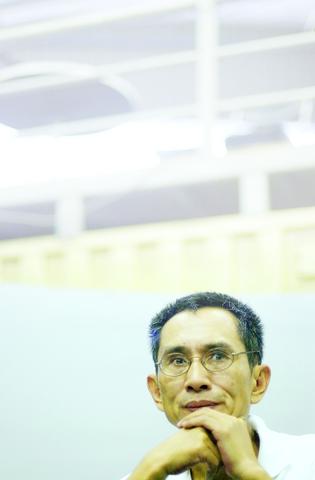
PHOTO: CHEN CHENG-CHANG, TAIPEI TIMES
His early work was known for its strong narrative and political elements, most notably in Songs of the Wanderers (家
Although Lin's new work is based on a more personal philosophy, it is still deeply rooted in Chinese tradition. Lin explains: "As I grow older I think less is more. I really think audiences should not expect themselves to understand a work. They should enjoy the work, interpret the work, they should take off into their own fantasy." He talks about watching the water flow along the Tamsui river near his home "Watching the water, it tells you a lot of things, but it doesn't say anything. It is so complicated, so intricate to see the ripples and the flow, full of expression but it doesn't pretend to tell you anything," Lin said.
To this end, Lin, Taiwan's foremost choreographer, makes the ironic comment: "down with choreography, present the dancers." He has left behind narrative altogether, which is an "obstacle between their [the dancers'] being and the audience. ... When I watch them, I think their bodies and their movement is sufficient already, you don't have to add anything.
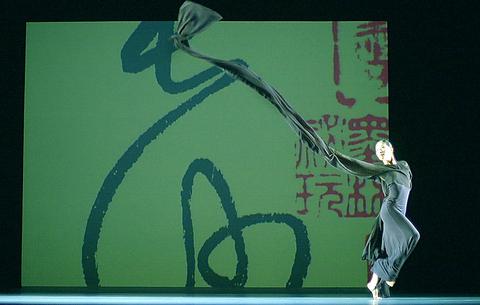
"What I care about is the communication between the stage and the audience, and the best communication is pure interaction of energy," Lin said. The fluid movements of Cursive, with its rushes of speed inter-cut with slow surges of power, has a mystical quality, and Lin tells of people who have seen a performance of Moon Water who had later come up to him in tears to thank him for the almost miraculous effects of watching the dance.
"There was a lady who had practiced tai chi for 10 years, but had never got it through. The chi did not flow. But after watching Moon Water, the chi in her body was all moving. It opened up the passages for the chi. It sounds tacky maybe, but its not, because things really vibrate. It's energy. When we rehearse in a small room, I cannot sit still, because I get so much energy running through me," Lin said.
For Lin, it is this energy which is the most direct form of communication.
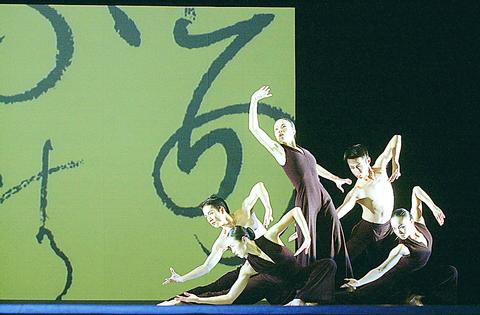
While Moon Water was extremely slow, Lin said with Cursive, he has greatly increased the range of movement. "This is because the dancers' bodies are more capable now," Lin said.
Lin has put considerable time and energy into training Taiwan's dancers, creating the department of dance at the Taipei National Institute of the Arts (台
Cursive is the product of these many years of development in dance, with dancers of a caliber to allow Lin to strive for "pure aesthetics." He said he had wanted to do a performance like this for 20 years, but only now are Taiwan's dancers ready for the challenge.
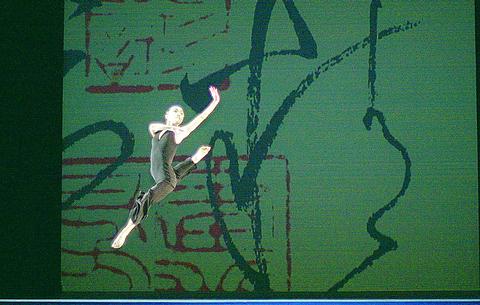
"We play a game, they challenge me and I challenge them," he said. While the dancers in Cursive dance against a backdrop of some of China's greatest calligraphy, Lin said he wanted to distance himself from interpretation of these texts. They are cropped in such a way they cannot really be read. The music was especially composed for the performance, joining traditional Chinese instruments with a cello, which provides the gravity and bass tones.
Once complete, Cloud Gate will resume its arduous touring schedule. Last year, Cloud Gate spent four months on the road, and this year five months will be spent on tour. Although now set to open, such is Cloud Gate's reputation that Cursive has already been booked for numerous engagements at international events in coming years.
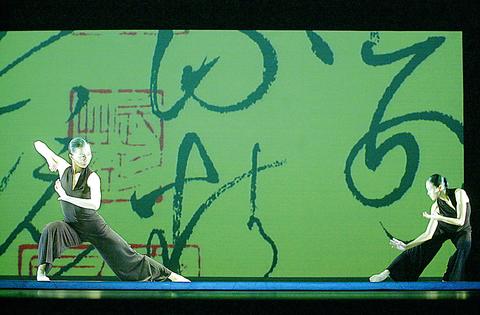

That US assistance was a model for Taiwan’s spectacular development success was early recognized by policymakers and analysts. In a report to the US Congress for the fiscal year 1962, former President John F. Kennedy noted Taiwan’s “rapid economic growth,” was “producing a substantial net gain in living.” Kennedy had a stake in Taiwan’s achievements and the US’ official development assistance (ODA) in general: In September 1961, his entreaty to make the 1960s a “decade of development,” and an accompanying proposal for dedicated legislation to this end, had been formalized by congressional passage of the Foreign Assistance Act. Two

Despite the intense sunshine, we were hardly breaking a sweat as we cruised along the flat, dedicated bike lane, well protected from the heat by a canopy of trees. The electric assist on the bikes likely made a difference, too. Far removed from the bustle and noise of the Taichung traffic, we admired the serene rural scenery, making our way over rivers, alongside rice paddies and through pear orchards. Our route for the day covered two bike paths that connect in Fengyuan District (豐原) and are best done together. The Hou-Feng Bike Path (后豐鐵馬道) runs southward from Houli District (后里) while the

March 31 to April 6 On May 13, 1950, National Taiwan University Hospital otolaryngologist Su You-peng (蘇友鵬) was summoned to the director’s office. He thought someone had complained about him practicing the violin at night, but when he entered the room, he knew something was terribly wrong. He saw several burly men who appeared to be government secret agents, and three other resident doctors: internist Hsu Chiang (許強), dermatologist Hu Pao-chen (胡寶珍) and ophthalmologist Hu Hsin-lin (胡鑫麟). They were handcuffed, herded onto two jeeps and taken to the Secrecy Bureau (保密局) for questioning. Su was still in his doctor’s robes at

Mirror mirror on the wall, what’s the fairest Disney live-action remake of them all? Wait, mirror. Hold on a second. Maybe choosing from the likes of Alice in Wonderland (2010), Mulan (2020) and The Lion King (2019) isn’t such a good idea. Mirror, on second thought, what’s on Netflix? Even the most devoted fans would have to acknowledge that these have not been the most illustrious illustrations of Disney magic. At their best (Pete’s Dragon? Cinderella?) they breathe life into old classics that could use a little updating. At their worst, well, blue Will Smith. Given the rapacious rate of remakes in modern